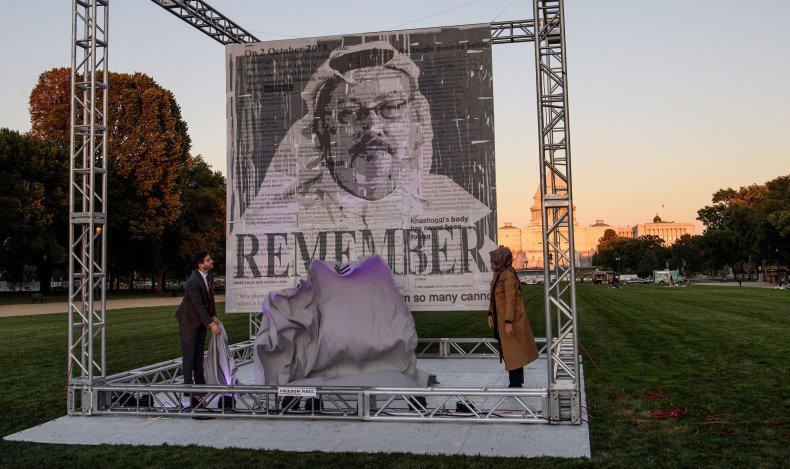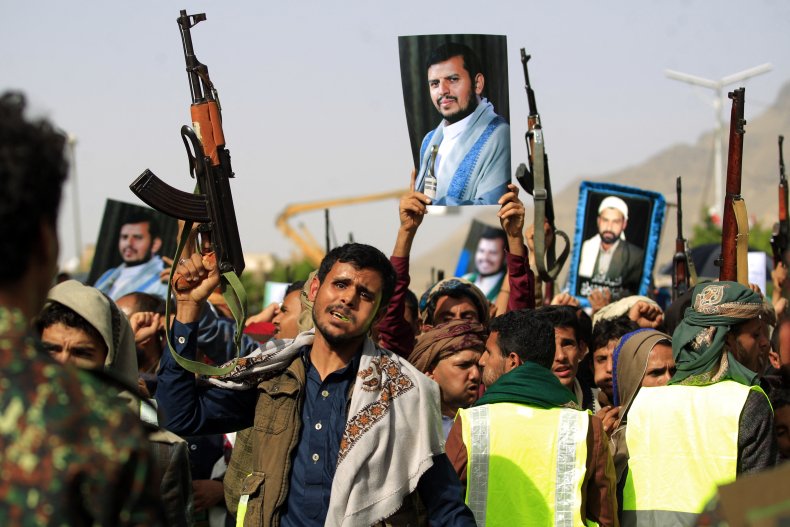TOM O'CONNOR AND FATMA KHALED
As President Joe Biden prepares for his meeting with Mohammed bin Salman, the powerful Saudi crown prince known worldwide simply as "MBS," the plans of his visit are overshadowed by a mounting energy crisis that is likely to dominate their discussions next month in the coastal city of Jeddah.
With the national average price of gas in the United States now surpassing an unprecedented $5 a gallon and still rising with no clear end in sight, domestic frustration threatens to derail Biden's foreign policy agenda at a time when the president is looking to continue rallying the country and its allies in support of tough measures against energy titan Russia in response to its ongoing war in Ukraine.
Perhaps no other person at this moment in time has as much power to influence the dynamic of the world oil market as Prince Mohammed, a man whom Biden has called "a pariah" due to allegations of human rights abuses. The crown prince's de facto leadership within his country's absolute monarchy grants him the ability to increase his wealthy kingdom's energy production, bringing down the price of oil worldwide.
But if that is to happen, there will be a price to pay, and Biden will have to deal with Prince Mohammed to get it.
Former U.S. and Saudi officials, as well as experts, told Newsweek that Saudi Arabia would likely seek security assurances from the U.S. related to Iran and its Yemeni ally, the Houthi movement, together with an understanding that Biden would move past criticisms of the kingdom's human rights record, particularly those regarding the grisly 2018 murder of Saudi journalist Jamal Khashoggi, a resident of the United States.
The White House has sought to downplay the importance of Biden's meeting with Prince Mohammed, confirming the upcoming encounter only through the words of officials rather than with a public readout. But the highly anticipated sit-down is likely to dominate the visit both in symbolism and substance.
Salem al-Yami, a former official of the Saudi Foreign Ministry, told Newsweek that Biden "must see MBS, and he can't meet any officials until he meets with him first, especially since Biden said things about MBS that were inappropriate in the past."
Biden's past comments toward Prince Mohammed have used language typically reserved for staunch adversaries such as Russian President Vladimir Putin, whose alleged targeting of opposition members and decision to launch a war in Ukraine has only reinforced the U.S. leader's view of his counterpart in the Kremlin as a "killer" and, more recently, a "war criminal."
But now that Putin's war has prompted the U.S. and its European allies to ban the import of much of the Russian oil and gas that supplied a large part of energy needs of the West, the subsequent shock to the market has emerged as a top threat to Biden and the Democratic Party.
While Yami noted that any Saudi plan to increase oil production as a means of offsetting these rising costs for the U.S. would have to align with the kingdom's existing agreements with the rest of the Organization of Petroleum Exporting Countries (OPEC) cartel, he said that "the Saudis are capable of finding a way to supply America with the oil they need."
"But," he emphasized, "there will be an exchange for that, and, at this point, America has to do a lot of things."
 An image of Saudi Crown Prince Mohammed bin Salman is displayed on the opening night of the Riyadh Season festivities in the Saudi capital late on October 20, 2021. The young royal was named minister of defense shortly after his father, King Salman, came to power in 2015 and later replaced his uncle as heir apparent in the first of a series of power plays that have given him major influence in the kingdom.FAYEZ NURELDINE/AFP/GETTY IMAGES
An image of Saudi Crown Prince Mohammed bin Salman is displayed on the opening night of the Riyadh Season festivities in the Saudi capital late on October 20, 2021. The young royal was named minister of defense shortly after his father, King Salman, came to power in 2015 and later replaced his uncle as heir apparent in the first of a series of power plays that have given him major influence in the kingdom.FAYEZ NURELDINE/AFP/GETTY IMAGESSince forging their modern defense ties in the wake of World War II, the relationship between Washington and Riyadh has long been subject to periods of ups and downs. But an overarching understanding has run throughout that the stability of the kingdom and its ruling House of Saud were paramount to ensuring the strategic U.S. position as guarantor of energy security in the Persian Gulf region.
These interests have almost always overshadowed longstanding human rights concerns, especially regarding women, religious minorities and those, like Khashoggi, who question the royal family.
The U.S.-Saudi partnership managed to not only weather but expand after the U.S. "War on Terror," launched two decades ago in the wake of the 9/11 attacks, in which 11 out of the 15 hijackers involved in the Al-Qaeda plot were Saudi nationals. A key to maintaining those ties over the years has been a shift among the wealthy Sunni Muslim monarchies away from viewing Israel as a top threat, and toward perceiving revolutionary Shiite Muslim Iran as a leading common foe.
But, as Yami pointed out, the Kingdom of Saudi Arabia has increasingly questioned the U.S. commitment to the region in more recent years, as priorities appeared to shift elsewhere.
"Iran's role in the region is concerning," Yami said. "The U.S. didn't assist KSA (the Kingdom of Saudi Arabia) in helping with resolving certain issues in the region that Saudis care about such as the situation in Yemen. The U.S. role in the crisis in Syria is weak. Those are topics that KSA is highly prioritizing."
Buying cheap Russian oil, China and India help Putin Blunt West's Sanctions
And though it was the last Democrat in power, former President Barack Obama, who led the U.S. to back rebels against Iran's ally, President Bashar al-Assad, in Syria and who first supported Saudi Arabia's bid to defeat the fellow Iran-aligned Houthi movement, officially Ansar Allah, in Yemen, Riyadh sees Biden as falling for a partisan slant on putting human rights first while failing to sufficiently address Washington's own shortcomings, something Yami said "is one thing that ruins the U.S.-Saudi relations."
"Democrats are always discussing such issues, even though the world knows the U.S. is not the best to give lessons on human rights," Yami argued.
"The way the U.S. targets Saudi Arabia when addressing human rights violations is unacceptable," he said. "The U.S. sees that Saudi Arabia is above the law and needs to be held accountable and punished, and this is not a proper diplomatic language that should be used between two countries who are allies."
This was especially the case in Biden's initial hardline response to Khashoggi's killing at the hands of Saudi security personnel, who were deemed by U.S. intelligence to be acting under the direct approval of Prince Mohammed. Then-President Donald Trump opted to largely overlook the case in favor of closer ties with the kingdom, even vetoing congressional attempts to cut U.S. military aid for the Saudi-led coalition's war effort in Yemen.
"Bringing up the Khashoggi case will not help the U.S.," Yami said, "and interfering in such cases doesn't help the Americans."
"Because if they want better relations," he added, "they need to leave governments to handle those cases on their own."
 Turkish writer Hatice Cengiz (R), fiancée of Saudi journalist and dissident Jamal Khashoggi, unveils a portrait of Khashoggi on the National Mall in Washington, D.C. on October 1, 2021, during a memorial ceremony marking the third anniversary of his murder at the Saudi consulate in Istanbul. A month after coming to office, President Joe Biden's administration announced a series of sanctions on certain Saudi citizens in response to the slaying, but emphasized that this was part of a a "recalibration" in ties, "not a rupture."NICHOLAS KAMM/AFP/GETTY IMAGES
Turkish writer Hatice Cengiz (R), fiancée of Saudi journalist and dissident Jamal Khashoggi, unveils a portrait of Khashoggi on the National Mall in Washington, D.C. on October 1, 2021, during a memorial ceremony marking the third anniversary of his murder at the Saudi consulate in Istanbul. A month after coming to office, President Joe Biden's administration announced a series of sanctions on certain Saudi citizens in response to the slaying, but emphasized that this was part of a a "recalibration" in ties, "not a rupture."NICHOLAS KAMM/AFP/GETTY IMAGESMohammed al-Hamed, president of the Saudi Elite group and an expert in U.S.-Saudi relations, echoed this point.
"Unfortunately, when Biden came to the office he came under the effects of the fake-news media and the radical-left agenda," Hamed told Newsweek. "So I hope he now once again focuses on the American interests and the global stability that won't happen without a very strong partnership with Saudi Arabia based on mutual respect."
The stark contrast between the Trump and Biden approaches to Saudi Arabia have been among the biggest differences in two foreign policy tracks that have otherwise seen significant continuity, even if the two men conducted their presidential affairs with very different tones.
Two of Biden's earliest major foreign policy decisions after taking office were to heed Congress' earlier calls to end U.S. offensive support for the Saudi-led coalition against the Houthis, and to reverse the rebel group's designation as a terrorist organization, which allowed humanitarian assistance to flow more easily into the conflict-ravaged nation.
The crown prince, for his part, has remained stalwart in his ruling style. Since being named defense minister in 2015 and then heir apparent to his father, King Salman, two years later in a royal shuffle, the 36-year-old Prince Mohammed has pursued a dual approach of instituting sweeping reforms in the kingdom while simultaneously consolidating political and military power in his corner.
When asked during a March interview with The Atlantic to comment on Biden previously shunning official contact with him, MBS shrugged it off.
"I simply do not care," Prince Mohammed said at the time. "It's up to him to think about the interests of America. Go for it."
This stance reflects that of the kingdom, Hamed argues, who says that now it is up to Biden to weigh his human rights criticisms against Prince Mohammed's reforms, particularly if he wants Saudi Arabia to enlist OPEC's help in regaining global energy stability, not to mention resolving a U.S. gas crisis Hamed said came "after the Democrats' energy politics, and many other reasons after the pandemic."
"The leaders in Saudi Arabia and the Gulf countries are looking for a real U.S commitment in the region's security," Hamed said, "stopping the Iranian terrorist activities, and not to interfere in the internal affairs of the countries."
The soaring U.S. gas prices have roots that predate Russia's incursion into Ukraine. A decline in demand during the pandemic led to a drop in domestic production, which remains lower than pre-pandemic levels despite the administration urging executives to ramp up production as prices continue to rise.
Saudi Arabia may not be able to address the full extent of the issues the U.S. faces, but its unique status as a leading oil producer with spare capacity by way of OPEC's caps puts the kingdom in a position to at least partially relieve the upward trajectory of oil costs that translate to higher gas prices and, by extension, greater expenses for all goods requiring fuel for transport.
Riyadh's rival, Tehran, also has a potential capacity to contribute substantially, but U.S. sanctions reinstated by Trump's unilateral exit from a 2015 nuclear deal continue to hamper its ability to sell oil and gas. Biden has explored reentering the agreement through a series of ongoing talks in the Austrian capital of Vienna, but negotiations remain stalled over sticking points in the final stretch, including Biden's refusal to reverse Trump's decision to list the Revolutionary Guard as a terrorist organization, as Biden did with the Houthis.
Such a move would likely rile Saudi Arabia, as Prince Mohammed once likened Iranian Supreme Leader Ayatollah Ali Khamenei to Nazi Germany leader Adolf Hitler, even though Riyadh and Tehran have more recently pursued quiet diplomacy. Iran, for its part, has always denied seeking nuclear weapons, and has accused Saudi Arabia of funding militants of its own, including those with links to Al-Qaeda and the Islamic State militant group (ISIS).
Saudi international conflict analyst Saad Abdullah al-Hamid told Newsweek that, in addition to the halt in arms sales to Riyadh, one of the main factors "that tensely affected the relations between the United States and Saudi Arabia" was Biden's "hesitation when it comes to negotiating a nuclear deal with Iran." This, Hamid argued, "encourages Tehran to achieve its program goals."
 Supporters of Yemen's Houthi, or Ansar Allah, movement raise portraits of their leader Abdul Malik Al-Houthi during a rally in the capital Sanaa on June 3, a day after the country's warring parties agreed to renew a two-month truce. Yemen has been gripped by conflict since the Iran-aligned rebels took control of the capital Sanaa in 2014, triggering a Saudi-led military intervention in support of the beleaguered government the following year.MOHAMMED HUWAIS/AFP/GETTY IMAGES
Supporters of Yemen's Houthi, or Ansar Allah, movement raise portraits of their leader Abdul Malik Al-Houthi during a rally in the capital Sanaa on June 3, a day after the country's warring parties agreed to renew a two-month truce. Yemen has been gripped by conflict since the Iran-aligned rebels took control of the capital Sanaa in 2014, triggering a Saudi-led military intervention in support of the beleaguered government the following year.MOHAMMED HUWAIS/AFP/GETTY IMAGESDaniel Shapiro, who served as U.S. ambassador to Israel under Obama and senior adviser to Biden's special envoy for Iran until March, told Newsweek that Saudi Arabia was looking for assurances that the U.S. will "retain significant military presence in the region to help Saudi Arabia address the threats of faces from Iran" as well as political promises to support a lasting solution to the war in Yemen, now in its seventh year.
In exchange, he said Washington would seek assurances of its own, not only on oil production, but also in balancing Riyadh's growing ties with Beijing and Moscow.
"The Saudis will make certain commitments about remaining fully aligned with the United States in its competition with Russia and China," Shapiro said, "which includes increased energy production to help strengthen the sanctions against Russia."
Unlike Biden, Putin and Chinese President Xi Jinping rarely comment on the domestic human rights situations of partner countries, and growing interest in Beijing's economic power and Moscow's military equipment has developed as a counterweight to Riyadh's relationship with Washington.
"If the United States is not committed to helping Saudi Arabia face its security threats," Khaled Batarfi, an international relations professor at Alfaisal University in Riyadh, told Newsweek, "then they have to understand our decision to search for new allies who would be more committed in meeting our security demands."
With this daunting geopolitical reality setting in, Joseph Westphal, who served as Obama's ambassador to Saudi Arabia, told Newsweek he believed that Biden sees "the bigger picture," even if the president would have to answer to a chorus of critics at home.
Westphal said it was important that Biden emphasizes in his meetings that "we need the support of the international community against what Russia is doing, so we hope to have Saudi support for that, and that means making sure that that we can provide some stability to energy."
He also pointed out that in the likely absence of any formal deal, Riyadh's actions after the fact may ultimately provide some insight into whether or not Biden's gambit was a success.
"He doesn't need any kind of concrete agreement," Westphal said. "He just needs to put it on the table. A week from now, the Saudis would have announced that they're working with OPEC, or they're made the decision to do this and that."
"If that doesn't happen," he added, "then those meetings didn't go so well."
No comments:
Post a Comment